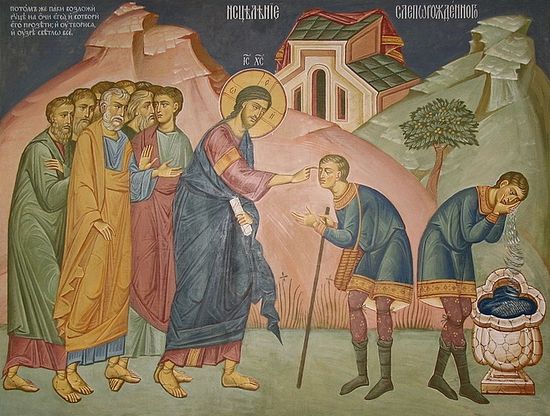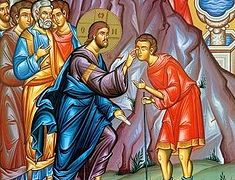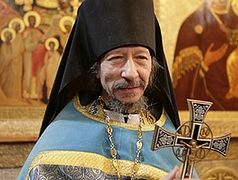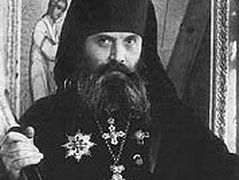
In the Name of the Father, the Son and the Holy Spirit.
Before his meeting with Christ the blind man had never seen anything. Everything was dark, he had to guess at things, to explore them by touch, to use his imagination. He had no clear authentic image of things. Then he met Christ, and Christ opened his eyes. And what was the first thing this man saw? The face of Christ, His gaze; the face of God become man, the divine gaze full of attentive, compassionate love resting on him, on him alone out of the whole crowd. Straight away he came face to face with the living God and encountered the miracle which so astonishes us: that God can focus His attention on each one of us — as on the lost sheep — and not see the crowd but see the one and only person. After that the man probably surveyed everything around him, and what he had known by description, by hearsay, became reality — "now I see".
It happens at the present time also; it can happen to each one of us. Like the man born blind we live most of our lives on alms, we sit like beggars at the roadside holding out a hand in the hope that someone will notice, if not us at least our hand, and give us something to sustain us for the next few hours at any rate. Such sustenance comes for us in the form of a friendly gaze resting upon us, a word spoken to us, a kindness done to us. But all this still leaves us by the roadside, blind and begging for help.
When Christ was passing another blind man, Bartimeus, that one did not wait for the Saviour to come up to him and ask him if he wanted to be saved, if he wanted his sight. As soon as he sensed that something unusual was happening in the noisy crowd, and in answer to his question was told who was passing by, he began to shout for help. True, people tried to stop him; true, a slight doubt may have crept into his mind, was it worth shouting, calling for help, would the Lord hear, would he respond to such a trifling need as his? He went on clamouring for help because his suffering was so great, his need was so desperate. He was prepared to push past the people, fight his way through the crowd in order to reach God and be heard by Him.
If only we could realise how blind we are. If only we could realise that our knowledge of life, not only eternal, divine life, but earthly life, depends almost entirely on hearsay, that the life around us is dim and ghostly because we are blind, or (like the other blind man in the Gospel, not immediately cured by Christ) see things in a mist. If only we could remember what the Saviour tells us about the beauty and the glory of both eternal and earthly life and not be satisfied with our blindness, how earnestly would we try to detain Christ, so that He might pierce us with His gaze and speak His sovereign, healing, life-giving word to us. Then indeed we might see the astonishing beauty of Christ's face, the fathomless beauty of the divine gaze resting upon us with mercy and compassion and tenderness. We use our eyes so easily, but we see little, and that superficially. Let us seek the vision that can be ours only, when our hearts become bright and pure. Blessed are the pure in heart for they shall see God; and in the brilliance of God's presence we might see each other, each one either illuminated by God's love, shining with the glory of eternal life, or else wounded, darkened, expecting from us not just alms but the surrender of our whole life through love in order that he might receive sight, that to him also the Kingdom of Heaven might already be revealed on earth.
19 May 1974



